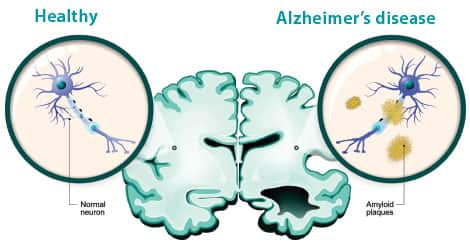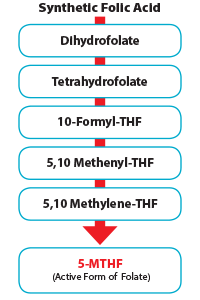Life Extension Magazine®
B vitamins are critical for the production of neurotransmitters in the brain.
Insufficiency is associated with cognitive decline.1-3
Folate has a number of mechanisms by which it can enhance cognitive performance. These include lowering inflammation and reducing homocysteine.1,4
Elevated homocysteine and chronic inflammation are linked to degenerative brain disorders.
Perhaps the most far-reaching implication of folate in the brain is its ability to modify gene expression.1
This means that folate plays a role in turning a gene “on” or “off.”
Without enough folate, genes involved in the production of beta-amyloid are “turned on.”5,6
Studies show that adding folic acid to brain cell cultures can silence—or “turn off”— genes that produce toxic beta-amyloid proteins.1,7
The takeaway from these studies is that folic acid performs a host of functions that support youthful brain cell structure and function.
What you need to know
- Mild cognitive impairment is an early indicator of dementia.
- Up to 15% of people over 65 years old with mild cognitive impairment will proceed each year to develop dementia, compared with less than 2% of those without mild cognitive impairment.16
- Studies show that mitigating mild cognitive impairment can ward off dementia, preserving more youthful cognition.
- A groundbreaking human clinical trial has found that supplementation with folic acid successfully improved cognitive function in adults with mild cognitive impairment.
- Deeper findings of the study show that folic acid reduces production of dangerous Alzheimer’s-associated proteins, while also lowering toxic homocysteine levels.
Folate’s Anti-Dementia Properties
The primary sources of folate (vitamin B9) include vegetables like broccoli, asparagus, spinach and Brussels sprouts. Cooking vegetables causes folate loss,8 which means we consume less of this nutrient than we might think.
One research group has been studying supplementation in older adults for half a decade. Their research has demonstrated folate’s beneficial effect on cognitive function.1,4,9
In their latest study, they explored the cognitive effect of supplementing with folic acid for an average of two years.1
The study included 180 subjects with mild cognitive impairment.1 Half received folic acid (400 mcg/day), while the other half received standard care (guidance on nutrition and activity aimed at enhancing memory late in life).
After 24 months, the people in the supplemented group experienced three encouraging results:
1. Improvements in cognitive testing
By the end of the study, the treatment group demonstrated significant increases in cognitive test scores, including full-scale IQ (which indicates a person’s average intelligence), verbal IQ, and measures of memory.
Combined treatment scores for the six verbal IQ tests were also significantly higher in the folic acid group, as was the combined treatment score for all 11 tests (full-scale IQ).1
2. Improvements in markers of DNA methylation
Supplementation was shown to beneficially affect genes involved in DNA methylation,1 thereby assisting the body to metabolize homocysteine.
In the supplemented group, two important blood markers were increased:
- Folate levels
- S-adenosylmethionine levels (SAMe, a natural compound that helps in the production of several key neurotransmitters and alleviates depression)
At the same time, two blood markers associated with poor cognitive outcomes were reduced:
- Homocysteine, a harmful amino acid that can lead to stroke, coronary disease, and dementia
- S-adenosyl homocysteine (SAH) levels, the precursor for homocysteine
The important ratio of SAMe/SAH was also increased, indicating a return to a healthy methylation.1
3. Reduced levels of brain-toxic proteins
Toxic beta-amyloid plaques are a hallmark of Alzheimer’s disease. These distorted proteins accumulate in the brain, where they damage brain cells and interrupt the communication between neurons. The result is loss of memory and brain function.
Folate can help prevent beta-amyloid plaques from forming.
This study showed that subjects in the supplemented group had significantly lower blood levels of molecules involved in forming these brain-damaging plaques.1 Blood levels of these plaque-forming molecules reflect their accumulation in the brain. The presence of plaque-forming molecules may predict early Alzheimer’s disease or cognitive decline.1,10-12
Overall, this study showed that folic acid supplementation significantly improved cognitive performance as seen by the increases in cognitive test scores. In addition, folic acid also reduced the abundance of beta-amyloid that directly damages brain cells.1
What’s interesting about this study is the low-dose of folic acid used. Many older people are deficient in folic acid and other B vitamins and essential nutrients, meaning their levels of the bioactive form of folate, called 5-MTHF (5-methyltetrahydrofolate), are also perilously low.
People with elevated homocysteine often take 1,000 mcg to 10,000 mcg of 5-MTHF daily along with vitamins B12, B6 and B2. A number of previous studies have shown better results using 5-MTHF than standard folic acid.13-15

5-MTHF: The Best Form of Folate Supplementation
 |
In the body, the folate molecule goes through several enzymatic steps to become the active molecule 5-MTHF.17-19
In order to make the conversion from folate to the active 5-MTHF, an enzyme called methylenetetrahydrofolate reductase or MTHFR is necessary—and not everyone has sufficient activity of the gene that codes for this enzyme. It is estimated that between 5% and 10% of the population has a gene variant that reduces MTHFR activity by 70%,20 while nearly 50% of people of European descent have a genetic variation that decreases MTHFR activity by as much as 35%.18,19,21-24
Supplementation with 5-MTHF bypasses the enzyme defect and provides the body with exactly the right molecule it needs.
Summary
This new study has demonstrated that even low-dose folic acid supplementation produces changes in gene function and in biochemistry that benefit the aging brain.
The favorable change in gene expression results in reduced production of toxic (beta-amyloid) proteins implicated in dementia.
Additionally, folate lowers the high homocysteine levels that often accompany brain aging and dementia. As a result, folic acid supplementation helps preserve cognitive function in adults with mild cognitive impairment.
Slowing the progress of mild cognitive impairment could delay the onset of dementia like Alzheimer’s and Parkinson’s diseases.
There is no reason for people to be deficient in folic acid as it is a remarkable low-cost nutrient.
If you have any questions on the scientific content of this article, please call a Life Extension® Wellness Specialist at 1-866-864-3027.
References
- Ma F, Li Q, Zhou X, et al. Effects of folic acid supplementation on cognitive function and Abeta-related biomarkers in mild cognitive impairment: a randomized controlled trail. Eur J Nutr. 2017.
- Smith AD, Refsum H. Homocysteine, B Vitamins, and Cognitive Impairment. Annu Rev Nutr. 2016;36:211-39.
- Michelakos T, Kousoulis AA, Katsiardanis K, et al. Serum folate and B12 levels in association with cognitive impairment among seniors: results from the VELESTINO study in Greece and meta-analysis. J Aging Health. 2013;25(4):589-616.
- Ma F, Wu T, Zhao J, et al. Folic acid supplementation improves cognitive function by reducing the levels of peripheral inflammatory cytokines in elderly Chinese subjects with MCI. Sci Rep. 2016;6:37486.
- Salminen A, Haapasalo A, Kauppinen A, et al. Impaired mitochondrial energy metabolism in Alzheimer’s disease: Impact on pathogenesis via disturbed epigenetic regulation of chromatin landscape. Prog Neurobiol. 2015;131:1-20.
- Leszek J, Sochocka M, Gasiorowski K. Vascular factors and epigenetic modifications in the pathogenesis of Alzheimer’s disease. J Neurol Sci. 2012;323(1-2):25-32.
- Li W, Liu H, Yu M, et al. Folic acid administration inhibits amyloid beta-peptide accumulation in APP/PS1 transgenic mice. J Nutr Biochem. 2015;26(8):883-91.
- Fabbri ADT, Crosby GA. A review of the impact of preparation and cooking on the nutritional quality of vegetables and legumes. International Journal of Gastronomy and Food Science. 2016;3:2-11.
- Ma F, Wu T, Zhao J, et al. Effects of 6-Month Folic Acid Supplementation on Cognitive Function and Blood Biomarkers in Mild Cognitive Impairment: A Randomized Controlled Trial in China. J Gerontol A Biol Sci Med Sci. 2016;71(10):1376-83.
- Teunissen CE, de Vente J, Steinbusch HW, et al. Biochemical markers related to Alzheimer’s dementia in serum and cerebrospinal fluid. Neurobiol Aging. 2002;23(4):485-508.
- Bush AI, Whyte S, Thomas LD, et al. An abnormality of plasma amyloid protein precursor in Alzheimer’s disease. Ann Neurol. 1992;32(1):57-65.
- Martins RN, Muir J, Brooks WS, et al. Plasma amyloid precursor protein is decreased in Alzheimer’s disease. Neuroreport. 1993;4(6):757-9.
- Caruso R, Campolo J, Sedda V, et al. Effect of homocysteine lowering by 5-methyltetrahydrofolate on redox status in hyperhomocysteinemia. J Cardiovasc Pharmacol. 2006;47(4):549-55.
- Pietrzik K, Bailey L, Shane B. Folic acid and L-5-methyltetrahydrofolate: comparison of clinical pharmacokinetics and pharmacodynamics. Clin Pharmacokinet. 2010;49(8):535-48.
- Lamers Y, Prinz-Langenohl R, Bramswig S, et al. Red blood cell folate concentrations increase more after supplementation with [6S]-5-methyltetrahydrofolate than with folic acid in women of childbearing age. Am J Clin Nutr. 2006;84(1):156-61.
- Arsenault-Lapierre G, Bergman H, Chertkow H. Word reading threshold and mild cognitive impairment: a validation study. BMC Geriatr. 2012;12:38.
- Bailey LB, Gregory JF, 3rd. Folate metabolism and requirements. J Nutr. 1999;129(4):779-82.
- Leemans L. [Does 5-methyltetrahydrofolate offer any advantage over folic acid?]. J Pharm Belg. 2012(4):16-22.
- Obeid R, Holzgreve W, Pietrzik K. Is 5-methyltetrahydrofolate an alternative to folic acid for the prevention of neural tube defects? J Perinat Med. 2013;41(5):469-83.
- Bezold G, Lange M, Peter RU. Homozygous methylenetetrahydrofolate reductase C677T mutation and male infertility. N Engl J Med. 2001;344(15):1172-3.
- Fukuda N, Hamajima N, Wakai K, et al. A cross-sectional study to find out the relationship of methylenetetrahydrofolate reductase (MTHFR) C677T genotype with plasma levels of folate and total homocysteine by daily folate intake in Japanese. J Nutr Sci Vitaminol (Tokyo). 2014;60(4):231-8.
- Lovricevic I, Franjic BD, Tomicic M, et al. 5, 10-Methylenetetrahydrofolate reductase (MTHFR) 677 C --> T genetic polymorphism in 228 Croatian volunteers. Coll Antropol. 2004;28(2):647-54.
- Prinz-Langenohl R, Bramswig S, Tobolski O, et al. [6S]-5-methyltetrahydrofolate increases plasma folate more effectively than folic acid in women with the homozygous or wild-type 677C-->T polymorphism of methylenetetrahydrofolate reductase. Br J Pharmacol. 2009;158(8):2014-21.
- Yafei W, Lijun P, Jinfeng W, et al. Is the prevalence of MTHFR C677T polymorphism associated with ultraviolet radiation in Eurasia? J Hum Genet. 2012;57(12):780-6.

